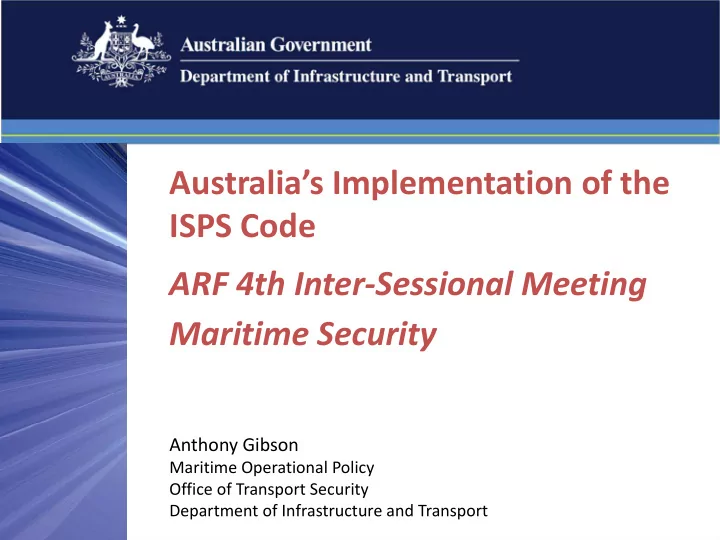

Australia’s Implementation of the ISPS Code ARF 4th Inter ‐ Sessional Meeting Maritime Security Anthony Gibson Maritime Operational Policy Office of Transport Security Department of Infrastructure and Transport
For Thought… • Does voluntary or coercive regulation work best with the maritime sector? Which approach does your security framework use?
Introduction • Australian approach to ISPS Code Compliance • Securing Critical Infrastructure • Recent Improvements to our Maritime Security Framework
ISPS Code Com pliance • The Department of Infrastructure and Transport is the Designated Authority for the Contracting Government of Australia • Within the Department, the Office of Transport Security is the Australian Government’s preventive security regulator • Australia is fully compliant with the ISPS Code and seeks to implement best practice
ISPS Code Com pliance • Australia fulfils its ISPS Code obligations through the Maritim e Transport and Offshore Facilities Security Act 2003 and Regulations • Intelligence-led, risk- based and outcom es- focussed framework
ISPS Code Com pliance • Regulations set out requirements for port, ship and offshore security plans • Plans must contribute to maritime security outcomes • All Maritime Industry Participants are assessed for compliance with ISPS Code when they submit plan for approval
ISPS Code Com pliance • OTS National Compliance Plan ensures high risk cases are subject to compliance activity • Regular audit and inspections of ports, port facilities and ships • OTS uses a range of compliance responses • Ongoing consultation with industry is crucial
Critical Infrastructure Protection • Shipping is crucial to Australian economy • Security risk assessments and maritime security plans are the basis for securing critical infrastructure • Continuous improvement of this process is a priority for OTS
Critical Infrastructure Protection • OTS considers impact of policy on industry operations • Recent changes to maritime security framework include: � Different categories of passenger ship � Ship Security Plan/ International Ship Security Certificates exemptions in exceptional circumstances � Maritime Screening Notice for Large Passenger Ships served on Capital City Ports
Critical Infrastructure Protection • Australia has security regulated the offshore oil and gas industry since 2005 • Disruption would have significant impact • OTS works with industry through the Oil and Gas Security Forum
Critical Infrastructure Protection OTS future priorities for critical infrastructure protection include: � Passenger ship screening � Waterside security measures � Front of house security at sea passenger terminals
Conclusion • ISPS Compliance is the foundation of effective maritime security • Australia’s maritime security framework builds upon the basic requirements of the ISPS Code
Questions? http://www.infrastructure.gov.au/transport/security/maritime/index.aspx
Recommend
More recommend